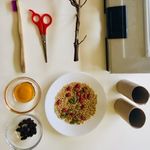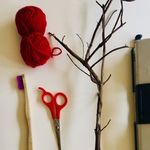MAKING A BIRD FEEDER STEAM ACTIVITIES - The New Art Gallery Walsall
←
→
Page content transcription
If your browser does not render page correctly, please read the page content below
The New Art Gallery Walsall STEAM ACTIVITIES Explore how Science, Technology, Engineering and Mathematics all meet Art. MAKING A BIRD FEEDER Purpose of the task (as required by the National Curriculum) yyTo educate primary years children on the importance of seasons for animals and plants yyTo explore the representation of different seasons in varied works of art yyTo undertake a practical art project of building a bird feeder using different recycled materials and foods yyTo encourage the identification of garden birds and to make sketches yyTo use digital cameras and social media to share their work
Let’s talk about Seasons:
1 2
What are What
the different season are
seasons? we in now?
3 4
Which Which
season has season has
the shortest the longest
days? days?
5
How long
does each
season last?
5
Have you Think about the trees, do they have leaves?
noticed any
What colours can you see?
changes to the
natural world Can you hear birds?
outside? Have you seen any flowers?
2Have a look at these works of art, all of which are from
The New Art Gallery Walsall’s Garman Ryan Collection:
zzCan you describe what you see in these images?
zzWhat season do you think it is and why?
Artworks left to right;
yy Eugène Delacroix (1800-63),
New Born Lamb, chalk on paper
yy Sir Jacob Epstein, Sunflowers,
watercolour, 1943
yy Georges Braque - Birds in Flight,
1953-55, coloured lithograph
yy Unknown, Egyptian blue glazed
figure of a Hawk, faience, c712-
30 BC
yy Theodore Garman, Villa Solaia,
oil on canvas, 1949
3MAKING Be mindful of the environment
and try to use recycled materials
A BIRD FEEDER like discarded cardboard / paper.
It is so important that birds, just like other animals, get enough food –
so they have enough energy for flying, breeding, laying eggs, feeding
their babies or even trying to protect themselves from birds of prey or
other animals that might want to eat them.
zzYou can make your own bird feeder to help
these birds get enough nutrition.
Things you will need:
1. Scissors
2. String
3. Hole punch
4. Peanut butter or corn syrup
5. Paint brush/ old tooth brush
6. 2 toilet roll tubes or 1 kitchen
towel tube (alternatively you
can roll one from cardboard)
7. Some wood twigs or a branch
8. Bird seed on a plate
9. Bits of apple/ raisins
4Method:
1. Cut your toilet roll tubes in
half, or kitchen roll tubes in
4 to make 4 identical small
tubes
2. Using a hole punch, make a
hole in each of the tubes
3. Using your brush, brush on
some peanut butter/ corn
syrup on the outside of the
tubes
4. Put your bird seed on a plate
and roll the tubes along the
seed
55. Cut some string and tie some
raisins/apple pieces around
it. If you have Cheerios, you
can thread them through the
string.
6. Thread the string through
the holes and tie the string
together
7. Now take your branch and
tie the feeders that you have
made around the branch
8. Hang your bird feeder in a
quiet area away from the
squirrels and enjoy bird
watching!
6Most common birds you may see and how
to identify them:
House Sparrow Starling Blue tit
Grey belly and Mostly black but white and Blue head and wings
brown feathers coloured spots all over and yellow body
Blackbird Wood pigeon Robin
Black with a yellow Grey in colour with a Bright red chest
beak, female is brown white patch on the neck
zzIf you need help identifying the bird, check this out!
www.rspb.org.uk/birds-and-wildlife/wildlife-guides/identify-a-bird
7Share your work with us:
zzIf you see any other birds, do take a picture
and share it with us!
zzWe would also love to see pictures of
your bird feeders in action!
facebook.com/newartgallerywalsall
twitter.com/newartgallery
instagram.com/thenewartgallerywalsall
Further resources:
Art and design RSPB
RSPB BBC
Key stages 1 and 2 Birds and
Bird watching Bird spotting
National curriculum Wildlife
© The New Art Gallery Walsall, 2020
8You can also read



























































